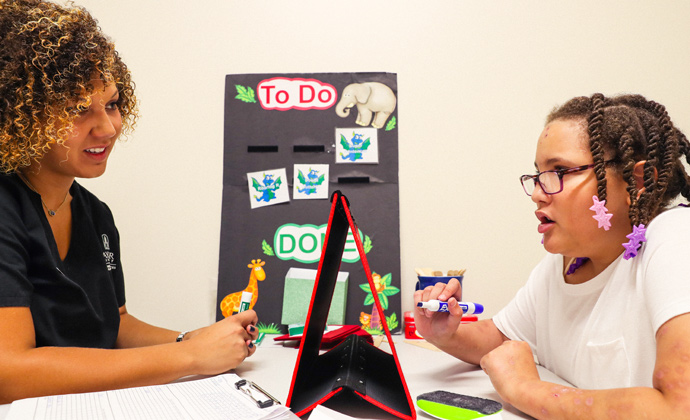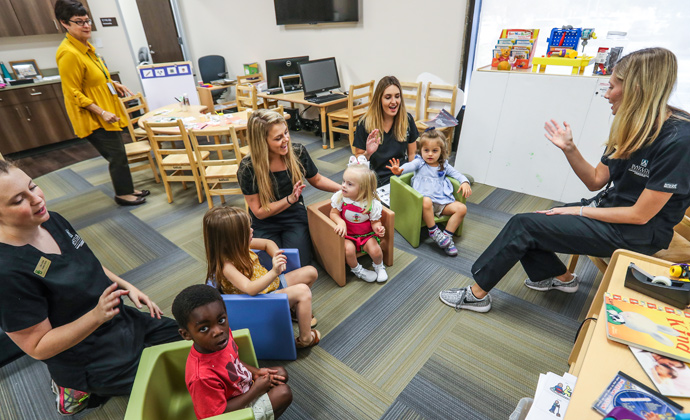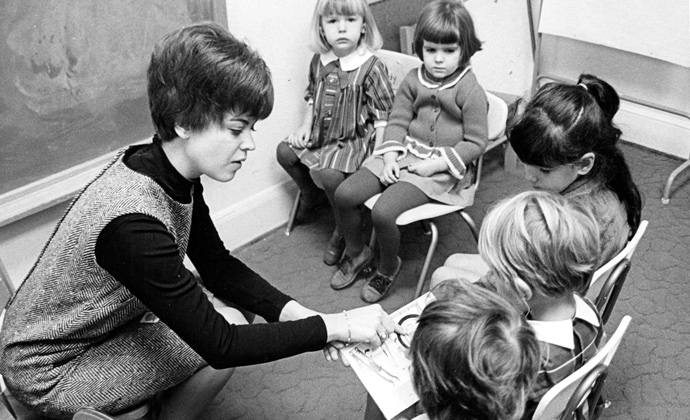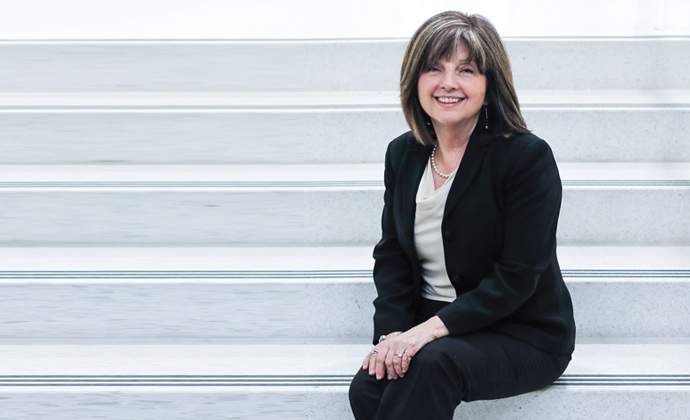Room for Growth
Reminders of hope and compassion welcome all at the entrance of the new home of Baylor’s Speech, Language and Hearing Clinic in the Cashion Academic Center.
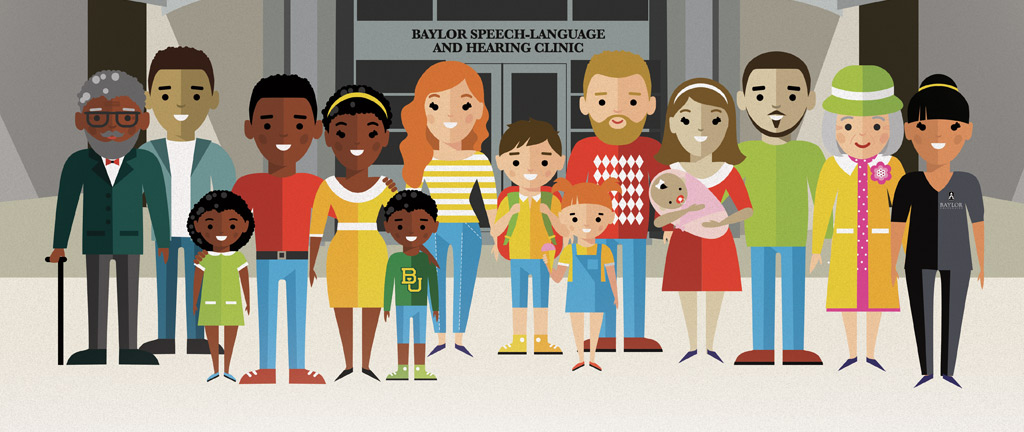
Scripture references at the doorway and in the reception area signal the heart and compassion to be found within the clinic:
Jesus answered, “I am the way and the truth and the life. No one comes to the Father except through me.” [John 14:6 NIV]
“I lift up my eyes to the mountains—where does my help come from? My help comes from the Lord, the Maker of heaven and earth.” [Psalm 121:1-2 NIV]
For parents of children with language, hearing and reading disorders and family members of adults suffering with communication challenges, the newly renovated facility is more than a building: it is hope. For the Baylor faculty and graduate students working with these patients, the clinic is a ministry, a calling, a place to serve.
“We really are here to serve,” says Michaela Ritter, EdD ’03, interim chair of the communication sciences and disorders (CSD) department at Baylor. “Our mission embodies the mission of Baylor, to educate men and women to become worldwide leaders in service in the areas of speech and language pathology.
“We integrate academic excellence, clinical experience and service to community. We attract excellent students, both undergraduate and graduate, who come to our program with a servant’s heart. They are ready to help individuals, and they fulfill our mission.”
The new clinic boasts 21 treatment rooms, two reading rooms, a motor lab, an audiology suite, research rooms and more. It is space needed to meet the needs of more children and adults with speech and language disorders in the community.
Yolanda Anderson, BA ’00, whose 4-year-old daughter Mabry is the third sibling to be aided by the speech program at Baylor, is grateful for the new facility, which opened in September. Anderson, a speech pathologist herself, points to the facility’s size and child-friendly atmosphere.
“We have a family history of speech and language disorders,” Anderson says. “Our other children have gone on and no longer need speech services, and we’re hoping it will do the same for Mabry.”
When his mother suffered a severe stroke 20 years ago, CSD graduate program director Dr. Jungjun Park discovered firsthand what an impact a speech pathologist can have on a family in need. He has never forgotten, reminding students that they improve the quality of life for the patient as well as for the patient’s family.
“I have experienced this kind of desperation that occurs in many places where our graduate students work,” Park says. “I feel greatly honored to be a part of this department, which is all about compassion, and I am humbled by this calling to serve our students.”
The Future
Two years ago, the CSD department received an anonymous $10 million gift from a Baylor family, setting the program on a fast-track for growth. With the gift - and the new home it afforded the CSD in Cashion - Ritter and her colleagues are planning to launch a doctoral program, expand the master’s program, add faculty positions and broaden the department’s research base. The timing is perfect when it comes to healthcare and the needs of the clients being served.
“Right now, healthcare is huge. Many universities are just now thinking about the need for programs like ours, but we’ve been working on our program and have proven it to be of top quality for more than 60 years,” Dr. David Garrett, BA ’80, MS ’81, says. The associate professor previously served as the CSD department chair and graduate program director. “We are way ahead of the curve. We have a great reputation in the academic community and the workforce.”
According to the U.S. Department of Labor’s Bureau of Labor Statistics, employment of speech-language pathologists (SLP), also called therapists, is projected to grow 21 percent in the next seven years—much faster than the average of all occupations.
“As the large baby-boom population grows older, there will be more instances of health conditions that cause speech and language impairments,” the report says. “The role of an SLP is to assess, diagnose, treat and help to prevent communication and swallowing disorders in patients. Speech, language and swallowing disorders result from a variety of causes, such as stroke, brain injury, hearing loss, developmental delay, Parkinson’s disease, a cleft palate
or autism.”
CSD undergraduate students complete courses that provide a strong foundation in speech-language pathology, observe the many clinics operated through the program and engage with faculty in research. An undergraduate student is trained in the processes of communication and speaking, including education in identifying and treating various disorders to communication and speech.
A master’s degree is required to be a SLP. Currently Baylor has 68 students enrolled in its master’s program with new students starting every semester—fall, spring and summer. The department fields roughly 350 applications each year for this highly sought-after degree and previously accepted only 10 to 15 students per semester. With its new space, the program plans to expand to 25 students per semester, eventually increasing enrollment to 100.
The CSD master’s program is composed of four semesters, three spent on campus and the final one spent off campus for an externship, generally in a hospital setting. The program provides a rigorous, hands-on training model which includes classes, clinical therapy, assessments, client record keeping and treatment planning. Students must complete 400 clinical hours in which they work directly with a client. As part of their clinical training requirements, graduate students provide treatment and assessment in a minimum of three different settings.
The new space was designed with students in mind. The graduate student lounge includes a large work area, cubicles for personal items, computers, comfortable chairs and visiting room. This home away from home helps further bond these students
who end up becoming more like a family than colleagues.
“It is truly amazing to see these graduate students bond together in a special way,” Garrett says. “We set up a system where we are rotating students every semester with a new group starting and a group graduating. We tell them to help each other, and to take the new students under their wings and support them. It has been really wonderful to watch that take place. I’ve often said that they learn as much from each other as they do from us. It fits with Baylor’s spirit and identity.”
With a consistent 100-percent employment rate of graduates over the past three years, the Baylor CSD graduate program is doing something right.
History of Service
A cornerstone program in the Robbins College of Health and Human Sciences, CSD has a long history of serving the Waco community, beginning as early as 1953 when it was part of the speech and radio department. Documents in Baylor’s Texas Collection indicate this degree included speech correction and voice science, speech education and a speech clinic. The earliest recognition of a clinic on campus, however, is 1960.
Prior to 2016, Neill Morris Hall, found near Pat Neff Hall and Brooks Village Residential Community, served as the home for the clinic and CSD. Garrett recalls the tight quarters of Neill Morris Hall—originally constructed in 1921 as the campus physical plant—and points to its space limitations as the main reason the department remained small while continuing to garner an excellent reputation within the speech pathology field.
“There is no doubt that we were bound by the size of our space,” Garrett says. “We were using every square inch of our space and using it as effectively as it could be used. Oftentimes, rooms had triple uses.”
The CSD graduate program, which offers a Master of Science in speech-language pathology and a minor in American Sign Language, has been recognized nationally in recent years. It holds a U.S. News top-tier graduate program status, according to the publication’s Ranking of America’s Best Graduate Schools—a difficult achievement without a doctoral program.
Clinics at Work
Five clinics operate under Baylor’s Speech, Language and Hearing Clinic umbrella and each week serve approximately 150 clients, including children and adults. Graduate students serve as the clinicians, supervised by clinical faculty members. The clinic is open 8:30 a.m. to 5 p.m.—Monday through Thursday for therapy; Friday for evaluations. No one is turned away because of cost.
The five clinics include Language and Literacy, the Language and Articulation Preschool, Speech and Language, Neural Rehabilitation, and Audiology. A sixth clinic, known as Camp Success, is an intense summer language and literacy intervention program started by Ritter and generously supported through a partnership with the Waco Scottish Rite.
“Our graduate students are required to have a certain amount of hours in every clinic,” Ritter says. “We have a national organization and accreditation agency which guides these requirements.”
The master’s program in speech-language pathology is accredited by the Council on Academic Accreditation in Audiology and Speech-Language Pathology of the American Speech-Language-Hearing Association.
Amazing work is being conducted within each clinic, and interdisciplinary studies, partnerships and new technologies are opening doors for further research in the department. The facility houses a clinical psychology doctoral student who uses the clinic as a practicum and is available to clients who may need a psychological consult or evaluation. A reading specialist is on staff to work with clients alongside clinicians. An ear, nose and throat doctor joined the clinic recently, and an occupational and physical therapist comes once a semester to screen clients who may need the services. Students are introduced to new technologies and equipment, including the use of a stroboscope, as part of the clinic’s partnership with the Baylor School of Music and EEG technology as it relates to children with language and reading disorders.
Graduate clinicians also work off-campus in several outreach programs in public schools managed by the department. Clinical Coordinator Deborah Rainer, BS ’81, MS ’82, is working to expand this outreach in the community with the addition of hospitals, private agencies and more schools.
With the variety of clinical experience and settings, graduates of the CSD master’s program are highly sought after in the workforce, and they feel well-prepared to enter their field.
“Baylor’s graduate program taught me how I could walk into a patient’s hospital room and essentially provide quality therapy from the contents of my coat pockets,” Nicole Rossen, BA ’09, MS ’11, says. “It’s not about having the fancy therapy materials; it’s about being the best therapist you can be.”
Since graduating, Rossen has worked in a school, hospital and clinic, and she has traveled throughout Texas teaching and speaking about her passion—phonology.
“Baylor’s program is an academic greenhouse where students can grow, learn and thrive,” Rossen says. “During graduate school, when I was studying, I used my brain, but when I was providing therapy, I used my entire being. You are engaged emotionally helping clients, and it is very fulfilling.”
With the demand rising, flexibility of settings and diverse clientele, speech pathology
is an attractive field for students who are looking for a financially stable career that also serves others.
“God called me years ago, to ministry,” Rainer, who is also a senior lecturer in CSD, says. “He put me where I am because this is my ministry. When you talk to most speech pathologists, they will say the same thing. This is what they were called to do. They have a passion for it. They have a love of people, and they want to help others. I think you will find that this is the overlying factor for all of us in the field.”
The Soul
While serving may be the very essence of speech pathology, what makes Baylor's CSD department unmatched is the history of its ministry, dating to 1953. At the core of this ministry are the people who have delivered it to the community year after year. The clinic might be the heart of the CSD department, but the students and faculty are its soul. They have changed countless lives in their willingness to serve. Thanks to the generous support of donors and community partners, they will continue to do so for generations to come.

